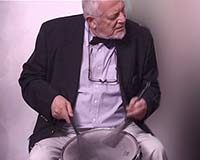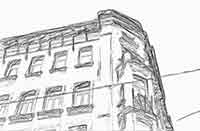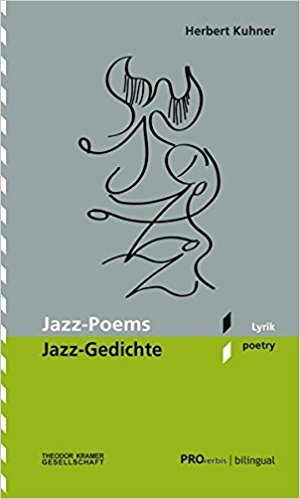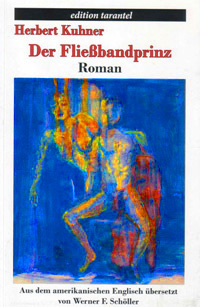Up the Creek – A Rehash of Past Events
For Prof. Reiner Lendl, “whose merits include the rediscovery of Austrian exile literature.”
Herbert Kuhner, the writer, is in a sense a historian. His life story runs parallel to history and illustrates that history is too serious matter to be left exclusively to bona fide historians. “In 1935, the year of his birth, the Nuremberg Laws were imposed in Germany. In 1938, when he was three years old, “The doorbell rang and I ran to the door and opened it. My mother swept me away as two men in street clothes entered. One of them, I remember clearly, wore a brownsuit and limped. The other was thin and balding and wore a grey suit. They searched the apartment. The brown-suited man pushed my grandmother, who was eighty-three away from the sideboard in order to ransack it. And indeed it contained her shopping money.” [1]
– Peter Malina, historian
In Retrospect
Msgr. Otto Mauer, Official Caretaker of Artists’ Souls in 1948, three years after the Holocaust: “The Jews have immense influence on communism and capitalism. They pass themselves off as defenders of humanity…but they are nothing but a depraved people with a perverted spirit…. They have been condemned to eternal damnation….They invariably choose the evil path.” [2]
During the event Encomium of the Personage Otto Mauer Wednesday, October 27, 1999, Archbishop’s Palace, Vienna, statement by Otto Mauer (click here) read by Herbert Kuhner, filmed by Fritz Kleibel, Title: Unterwegs mit Herbert Kuhner, 2014.
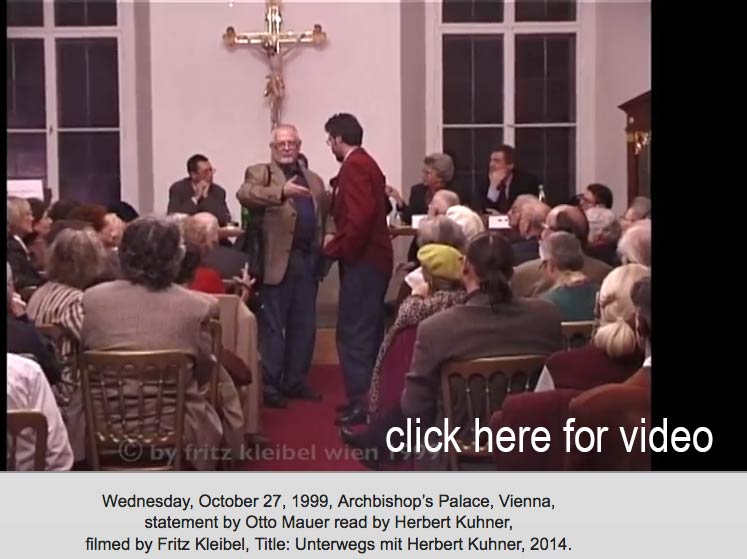
Mauer continues on the subject: “The choice of Barabbas at the time of Jesus is analogous
to the man with the submachine gun and the man who plants bombs in Palestine today…
it is impossible to believe in the realization of the Jewish state…
and the Jews are to blame that the Kingdom of God has not been established.
This promise will not be fulfilled until all heathens and then the Jews recognize the Church…
But first it will be the turn of the heathens and then the Jews.”[3]
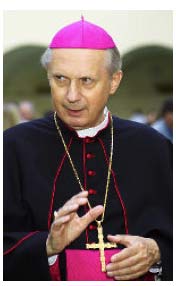
Bishop-Egon-Kapellari
A year later Mauer was more “conciliatory.” In 1949 he wrote: “There is a solution to the Jewish problem, but just one: the Jews must recognize Christ as the Messiah, the heathens must become Christians…”[4]
Bishop Egon Kapellari, Austria’s Bishop for Art: “Monsignor Otto Mauer, the unforgotten sponsor of contemporary art of his time, wrote in his renowned text, “A Discourse on Art,” that he was aware that society, yes even the state, had to defend itself against anti-humanistic, racial discriminatory, anti-Semitic, etc. art. “[5]
Otto Mauer, during the Third Reich: “The artist is in league with the devil, either as one possessed or as an exorcist.” [6]
“Some of the major Nazis came to Bishop (Alois) Hudal in Rome or Monsignor Otto Mauer in Vienna. The minor ones mostly to a high degree followed the requirement to register officially. [7]
“I saw individuals come to Mauer for help concerning their Nazi past. Among them was Heimeto von Doderer. Mauer also helped Otto Schulmeister, who belonged in the category of the guilty Nazis, and therefore wrote the pseudonym of Paul Viator.”[8]

painting by Otto Mühl
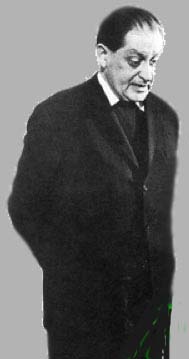
Monsignore Otto Mauer
Otto Mauer, the official “Catholic Caretaker of Artist’s Souls” was the pater familias of the Actionists. With Cardinal Franz König’s benediction, he promoted the poète maudit element of the Austrian cultural scene and helped mint their spirit.
Otto Mühl established the Commune in Prater Strasse in 1970 while he was being promoted by
Msgr. Otto Mauer. During this time Mühl went to the Allgemeinen-Kranken-haus-Hospital in Vienna with a group of children that were infected with venereal disease. The head nurse at the time was Greta Scherhak.[9]
Prelude: On April 17, 1967, Mühl along with Oswald Wiener and Peter Weibel presented an Actionist performance in Mauer’s St. Stephan’s Gallery.[11]
(This was followed by the sado-masochistic extravaganza at the University of Vienna on June 7th.)
Mühl had made a name for himself by engaging in public fecal orgies. These were to serve as the basis for the “failed experiment.”
In Weibel/Export’s Wien book, he is depicted with Hanel Koeck, art critic Peter Gorsen’s wife, copulating in feces.[12]
Ms. Koeck is an Actionism groupie and has also participated in similar performances with Hermann Nitsch.[13])
Concerning proceedings during the trial of Mühl on January 23, 1990: “After the moving descriptions of seven girls who were sexually abused by Mühl, a compilation of videos was shown after the courtroom had been cleared of spectators. In addition to violent actions by Mühl, his wife Claudia was shown forcing minors to engage in oral sex with her in front of an enthusiastic audience.
‘I have seen the films, and they cannot be compared to anything I’ve ever viewed,’ said Frau Jelinek, the judge, ‘The boys did not want to do it; they were in tears. They received a permanent shock. One was her son, the son and his stepmother!’ (One of the boys was the son of Otto Mühl and Claudia’s sister).”[14]
“District attorney Rabonog, still under the impression of the testimony of witnesses and the videos, stated in his summation: ‘I have taken part in many major trials, but the fate of the victims has never moved me so much as in this one. Mühl engages in the practice of terror. History has shown us what a concentration camp is. What the girls in the Friedrichshof had to go through was just as horrible. Otto Mühl experimented with people; he manipulated them. He was so sensitive as an artist that he thought that when a girl said “no” she meant “yes.”
The children weren’t voluntarily there; he had taken their parents from them, and thus the ability of leaving the commune. They didn’t have a chance.’”[15]
Otto Mauer, during the Third Reich:
“The artist is in league with the devil, either as one possessed or as an exorcist.” [16]
Günter Brus, Artist and Actionist, speaks:
“People have no idea about the crimes that have occurred in the name of the Church. People are mostly idiots.”[17]

Helping Those in Need
According to Albert Massiczek, Monsignor Otto Mauer in Vienna and Bishop Alois Hudal at the Vatican
aided Nazis at home and abroad.[18]
In Albert Massiczek’s words: “Some of the major Nazis came to Bishop (Alois) Hudal in Rome
or Monsignor Otto Mauer in Vienna. The minor ones mostly to a high degree followed the requirement to register officially.” [19]
“I saw individuals come to Mauer for help concerning their Nazi past.
Among them was Heimeto von Doderer. Mauer also helped Otto Schulmeister, who belonged in the category of the guilty Nazis, and thus wrote the pseudonym of Paul Viator.”[20]
The Good Samaritan and the Protégé
Former Third Reich publicist Otto Schulmeister and Otto Mauer collaborated as editors of the Catholic cultural monthly Wort und Wahrheit together, which they founded in the Fifties.
Otto Schulmeister laid it on the line 1989:
“There were many swine at the time, not only brown ones.” [21]
Asked whether he regretted what he had written during the Third Reich in National Socialist organs, he replied: “Not in the least!”[22]
Otto Schulmeister became a member of the Nazi Party in 1942. His doctoral thesis, “Die werdende Großraumwirtschaft“ (The Coming Greater Third Reich Economic Area) was published that same year in the Nazi publishing house “Berlin.” In this thesis he justified the German expansion in the East as restoration of the German Lebensraum.[23]
Mauer and his protégé, former Third Reich publicist Otto Schulmeister, collaborated as editors of the Catholic cultural monthly Wort und Wahrheit together, which they founded in the Fifties.
Otto Schulmeister, 1989: “There were many swine at the time, not only brown ones.” [24] Asked whether he regretted what he had written during the Third Reich in National Socialist organs, he replied: “Not in the least!”[25]
The “Rat Line”
The Vatican “Rat Line” helped “good Catholics” who had erred to escape to Spain and South America.
The Vatican preferred the Third Reich to the Soviet Union. That makes sense: Catholic criminals are preferable to atheistic ones.
The Bishop from Styria in Rome
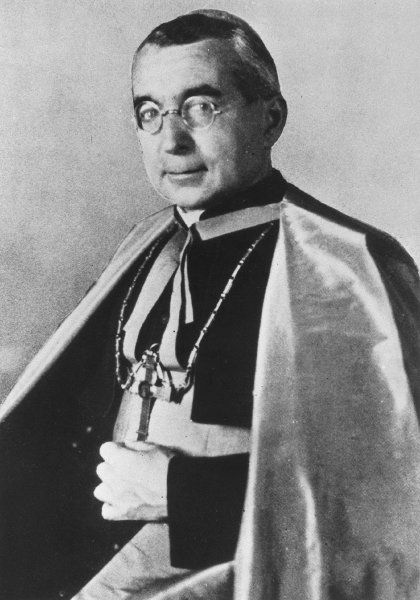
Alois Hudal, Engel der Nazis
Bishop Alois Hudal describes his good deeds: “After 1945 all my charitable work was primarily devoted to the former members of National Socialism and Fascism, particularly the so-called ‘war criminals,’ who were being persecuted and were frequently personally completely without guilt.”[26]
Bishop Hudal celebrates Christmas in 1945: “I am delighted to greet 110 wanted war criminals. They can be hunted far and wide. Here they are safe.”[27]
“The bishop (Hudal) entered the room and welcomed me with outstretched arms and said, ‘You must be Franz Stangl. I’ve been waiting for you.’”[28]
 (Franz Stangel was Commandant of Treblinka Concentration Camp. The number of his victims is nine-hundred-thousand) Stangl ended up in Brazil where Volkswagen gave him a sinecure in Sao Paulo. He made pocket money by advising the military dictatorship, as well helping Volkswagon to weed out and interrogate activists on their premises.
(Franz Stangel was Commandant of Treblinka Concentration Camp. The number of his victims is nine-hundred-thousand) Stangl ended up in Brazil where Volkswagen gave him a sinecure in Sao Paulo. He made pocket money by advising the military dictatorship, as well helping Volkswagon to weed out and interrogate activists on their premises.
His Excellency Bishop Hudal also helped Ustascha mass-murderer Ante Pavelic, SS-Colonel Walter Rauff, the inventor of the mobile gas van, to escape capture. Gustav Wagner, deputy commander of Sobibor, who killed a quarter of a million Jews. Josef Mengele, the murderous doctor of Auschwitz. Adolf Eichmann, chief architect of the Final Solution – to name a few.
Adolf Eichmann: “I recall with deep gratitude the aid given to me by Catholic priests in my flight across Europe and I decided to honor the Catholic faith by becoming an honorary member.”[29]
(Eichmann had been a Protestant)
His Master’s Voice
I was surprised when Edition Atelier of Wiener Journal agreed to take on Der Ausschluss (Memoirs of a 39er). However, following the acceptance came the stipulation that I use my own imprint and I ended up paying the tab – and there was worse to come.
I had set up a connection with an American university press for a book of poetry by a Carinthian Slovenian author;
Janko Ferk’s Buried in the Sands of Time resulted as a joint venture. However, the translator was not credited on the cover as had been agreed upon, and when I brought this to the publisher’s attention, my literary texts, which had been typeset for a forthcoming issue of the journal, were thrown out.
David Axmann, the cultural editor of Wiener Journal, let me know that Erhard Busek, Chief of Wiener Journal, wanted my departure. Busek, according to Matthias Dusini, “student and friend of Otto Mauer and Chairman of St. Stephan’s Gallery.” [30]
Setting the Tone
“We have to improve the system or we’ll be up the creek in one way or another.”
– Erhard Busek, Kurier, April 3, 2012
Since I was at odds with such powerful adversaries, my Ariadne colleague, thinking that I must be moribund, decided that he could be best served by giving me the coup de grâce.
I had brought two additional authors to the publishers for a bilingual co-publication venture with a pre-publication sales scheme. Subsequently, the university press and the translator were excluded from participation.
I wrote to the publisher and received a reply suggesting that I call to arrange a meeting. On February 14, 1990, I called Editor-in-Chief Peter Bochskanl. I was told over the phone, ‘Your behavior is revolting and uncouth. You have a persecution complex.’ When I reminded him that he had asked me to call, he gave me an appointment. The verbal abuse continued, and when he again accused me of bad behavior, I suggested he look in the mirror. At that he said, “Appointment cancelled!” and hung up. The same day, he sent me a bill demanding that I return the subsidy, subtracting my sales earnings for Memoirs and the translation fee for the Ferk book.
“Concerning the trilingual volume of poetry by Janko Ferk, for which Herbert Kuhner provided the English translation, it was the explicit wish of the American publisher (Donald G. Daviau) that Herbert Kuhner’s name as translator does not appear on the cover of the English edition; naturally we had to adhere to that wish.”
– Peter Bochskanl, Das Menschenrecht, Nr. 4, Dez. 1990
“So he’s (Bochskanl) trying to put the blame on me. That’s absolutely ridiculous. We always put the translator’s name on the cover.”
– Donald G. Daviau, letter to Herbert Kuhner, Dec. 10, 1990
“As far as the cover is concerned, I had nothing to do with the decision. The design was done in Vienna and my colleague (Ms. Joris Johns) accepted it. If I had made the decision, the result would have been the dame….Most English translations appear without the name of the translator the cover….I did not make the decision but I defend it.”
– Donald G. Daviau, Editor of Ariadne Press, Das Menschenrecht, January 16, 1991
Cancellation
On March 19, 1990, Herr Rainer Lendl of Edition Atelier wrote to his distributor, “We hereby cancel Herbert Kuhner’s Der Ausschluss from our publishing program. All copies are to be returned to the author.” And they were.
Thus I had been provided with a fitting epilogue for Memoirs of a 39er in 1990.
Here is David Axmann.’s, Afterword to Memoirs of a 39er:
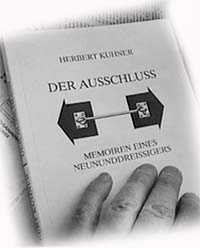 “This is a chronicle of an Austrian emigré, who as a child had to flee from the Nazis to the United States, who as a young man returned to the scene of the crime and discovered that the moral substance of the Austrian character has basically remained unchanged since 1945. Against the background of exemplary political, cultural-political and artistic emanations of an intolerant provincialism, which is a frightening way, of ever more bluntly anti-Semitic resentments, which we believed to have been overcome, the author creates a kaleidoscope of his personal life experiences in Austria, which were so bitter, depressing, humiliating and indeed frightening, that he finally comes to the dreadful conclusion: „When I returned to my birthplace to live, it was if I had never left. An important, authentic contribution to the ‘Memorial Year’ of 1988. “
“This is a chronicle of an Austrian emigré, who as a child had to flee from the Nazis to the United States, who as a young man returned to the scene of the crime and discovered that the moral substance of the Austrian character has basically remained unchanged since 1945. Against the background of exemplary political, cultural-political and artistic emanations of an intolerant provincialism, which is a frightening way, of ever more bluntly anti-Semitic resentments, which we believed to have been overcome, the author creates a kaleidoscope of his personal life experiences in Austria, which were so bitter, depressing, humiliating and indeed frightening, that he finally comes to the dreadful conclusion: „When I returned to my birthplace to live, it was if I had never left. An important, authentic contribution to the ‘Memorial Year’ of 1988. “
Here is a quote from an encomium for Prof, Rainer Lendl by then Chancellor Wolfgang Schüssel: “Reiner Lendl’s heart beats for Europe, especially for Middle Europe. Lendl’s merits include the rediscovery of Austrian exile literature. As an example he published the Austrian exile author Fritz Kalmar, who lives in Montevideo.”
One thing is for certain. Lendl’s heart does not beat for one exile author.
Here’s an official view: “The Nazis took Austria by force. The Austrians were the first victims.”[31]
The sovereign state of Austria was literally the first victim of the Nazi regime…. I consider this question to have been decided. The country was a victim of aggression, specifically a military aggression.
And here’s an analysis:
“Austrians were the first victims of Nazi Germany, and the Jews were the victims of the victims.”[33]
– Helmut Zilk, (Ex-)Mayor of Vienna
“Austrians may have rejoiced in 1938, but they welcomed annexation to the Reich, not National Socialism.“
– Josef Ratzenböck, Conservative Governor of Upper Austria
“You’ll find people in Gurk, who are either Socialists or Conservatives, who in certain situations may say that Hitler should be here now, but that doesn’t mean that they are Nazis. “[34]
– Karl Felsberger Deputy-Mayor of Gurk, Carinthia
A prominent witness of a brown hue reminisces: “Vienna has never been covered with so many flowers before and there will never be as many flowers in Vienna ever again…. This was not an act of war, but an act of liberation, a homecoming.”
Another chimes in: “Everyone can’t go onto the streets, but when the streets are packed with people, what more could you ask for?”[35]
Those days were dark for the victims but “bright” for those who maltreated and pilfered them.
Much of the population pitched in with verve, harassing, humiliating the Jewish victims and gathering up the spoils.
Assessments of a Translator
“Herbert Kuhner is predestined to represent Austria in Australia”
– Dr. Fritz Cocron, Director of the Austrian Institute in New York
“Yes, they’d send a writer but it wouldn’t be Kuhner.”
– Rosemary Wighten, Writers Committee, Adelaide Festival,May 4, 1977
“Herbert Kuhner is a less than mediocre author who would never be able to represent Austria in any way.”
– Dr. Wolfgang Kraus, Austrian Literary Society & Austrian Foreign Ministry, Official Report.
“Herbert Kuhner is insignificant as an author and he will never read on our premises.” [36]
– Dr. Reinhard Urbach, Austrian Literary Society
“The list of Austrian poets that Herbert Kuhner has rendered reads like. Who’s Who in Austrian Poetry.“
– Harry Zohn, Modern Austrian Poetry Journal, Riverside, CA
I was invited to Adelaide in order to recite my translations of Austrian poetry that had been published in the prestigious Poetry Australia, as well as my own poems.
– H.K.
After I published an article in the London-based Index on Censorship, concerning the official blocking of my invitation to the Adelaide Festival of 1976, all hell broke out!
Memoirs of a 39er contains the protocol of an event that took place on July 27, 1977. This episode I call Tea (and cookies) for Three (at the Foreign Ministry).
On July 26, 1977 I received a call from that venue requesting me to appear there the next day at 4 p.m. I came there at the appointed time. What followed was an interrogation in which the victim was called upon to make a written apology to the perpetrator. At half past six, I said, “I will not allow myself to be insulted any longer!” I managed to get to the door and leave the premises.
Anti-Climax
„Herr Kuhner, if you do not withdraw your case, we will send the public health officer”
– Anonymous caller, April 15, 1980, 9:15, a.m.
You cannot prove that this call came from the Foreign Ministry.
– Sigrid Löffler, literary critic
The Second Time Around
While the campaign to cancel me out was in full swing,
My mother was terminally ill.
It was the second time around for her.
The members of our who could not
exit from Third Reich-Austria,
were decimated.
David Axmann
Hunters and Collectors /Jäger und Sammler
Austrian Literary Forum, 1993
Poetry & Prose
Translated by Herbert Kuhner
Ein Abend für Axmann
An Evening for David Axmann (1947-2015)
Tuesday, Nov. 8, 2016,
The Austrian Literary Society
I was not on the program, nor was I invited to the event. I sent an email to the Literary Society on Sunday, November 16, 2016. There was no answer.
(I am never invited to “commemorations” for the victims the events that took place after “Austria was taken by force.” in 1938.)
Skirting the Truth
Headline: “We must improve the system; otherwise, we’ll be up the creek.”
– Erhard Busek, Kurier, 3. April 2012
I, for one, certainly was (and am) „up the creek!”
– H.K.
– Herbert Kuhner
* * * * *
[1] Peter Malina, Mit der Ziehharmonika, No.1, May, 1995
[2] Hugo Löwy: “Warum Haß?“ Renaissance, No. 10, May, 1948, p. 10: quoted from a lecture by Otto Mauer on April 10, 1948 at the Volkshochschule Alsergrund for the “Circle for Christian and Jewish Problems”; also referred to in No. 18, Jan. 1949; researched by Dr. Evelyn Adunka.
[3] Hugo Löwy: “Warum Haß?“ Renaissance, No. 10, May, 1948, p. 10: quoted from a lecture by Otto Mauer on April 10, 1948 at the Volkshochschule Alsergrund for the “Circle for Christian and Jewish Problems”; also referred to in No. 18, Jan. 1949; researched by Dr. Evelyn Adunka.
[4] Renaissance, No. 18, January, 1949.
[5] Salzburger Nachrichten, „Geistiger Widerstand“, Martin Behr, Interview mit Bischof Egon Kapellari, p. 14, 19. Nov. 2005.
filmed by Fritz Kleibel, Title: Unterwegs mit Herbert Kuhner, 2014.
[6] Günther Nenning , „Was Not tat,“ Die Presse, 11. Sept. 1999, Spectrum, S. V, Wien; Originalquelle: Otto Mauer, These zur Kunst, 1941.
[7] Albert Massiczek: „„Elefantenhäutig oder Diie Unschuld von Österreich, Falter 8/1988,, S. 5
[8] Albert Massiczek: Ich habe nur meine Pflicht erfüllt.Von den SS in den Widerstand. Ein Lebensbericht, Zweiter Teil, Junious Verlag, Wien, S. 147
[9] Sources: Greta Scherhak; Walter Jaromin, Detective.
[10] www.wienerzeitung.at Feb.2,2013.
[11] Peter Weibel, Valie Export, Eds.: Wien: Bildkompendium Wiener Aktionismus und Film, Kohlkunst Verlag, Frankfurt, 1970, p. 143.
[12] Weibel/Export, Wien, p. 75-78; Peter Gorsen: Das Nachleben des Wiener Aktionismus. Interpretationen und Einlassungen seit 1969, Ritter Verlag, Klagenfurt, 2009.
[13] Peter Weibel: “Ein deutscher Krimi,” Der Standard, April, 19, 1989, Vienna, p. 23.
[14] Andreas Schlothauer: Die Diktatur der freien Sexualität, p 174 :Schlothauer concerning proceedings during the trial of Otto Mühl on January 23, 1990
[15] Andreas Schlothauer: Die Diktatur der freien Sexualität, p 174.
[16] Günther Nenning , „Was Not tat,“ Die Presse, 11. Sept. 1999, Spectrum, S. V, Wien; Originalquelle: Otto Mauer, These zur Kunst, 1941.
[17] www.wienerzeitung.at Feb.2,2013.
[18] Albert Massiczek: Ich habe meine Pflicht erfüllt. Von der SS in den Widerstand. Ein Lebensbericht; Vol. 2, Junius Verlag, Vienna, 1989, p.147; Albert Massiczek: Elefantenhäutig oder die Unschuld von Österreich, Falter, No. 8, 1988, Vienna, p. 5.
[19] Albert Massiczek: „„Elefantenhäutig oder Diie Unschuld von Österreich, Falter 8/1988,, S. 5
[20] Albert Massiczek: Ich habe nur meine Pflicht erfüllt.Von den SS in den Widerstand. Ein Lebensbericht, Zweiter Teil, Junious Verlag, Wien, S. 147
[21] Inlandsreport, ORF, July 20, 1989; Medien und Zeit, No. 3, 1989, Vienna, p. 2,
[22] Ibid.
[23] Christa Zöchling: “Ex-‚Presse‘-Chef im Dienste der CIA: Otto Schulmeister agierte für den Geheimdienst.” Profil No. 17 April 20, 2009.
[24] Inlandsreport, ORF, July 20, 1989; Medien und Zeit, No. 3, 1989, Vienna, p. 2,
[25] Ibid.
[26] Alois C. Hudal, Römische Tagebücher, Lebensbeichte eines alten Bischofs, Leopold Stocker Verlag, Graz, 1976, p. 21
[27] Bishop Alois Hudal’s secretary, Hans Mayer, tape recording, 1979, Die Waffen SS, ZDF, 2002.
[28] Gerald Steinacker: Nazis auf der Flucht, Studien Verlag, Innsbruck, 2008.
[29] Ernst Klee, Persilscheine und falsche Pässe: wie die Kirchen den Nazis halfen., Fischer Taschenbuch Verlag, 1991, p. 25
[30] Matthias Dusini, Falter, Nr. 5, 1, Feb. 2006.
[31] Wolfgang Schüssel, Jerusalem Post, Nov. 9, 2000; Wiener Zeitung, Nov. 10/11, 2000.
[32] Wolfgang Schüssel, Österreichischer Bundeskanzler Neue Züricher Zeitung, Feb. 15, 2005.
[33]Wären die Wände zwischen uns aus Glas/If the Walls Between Us Were Made of Glass, Daniel, Diethart, Kuhner, Verlag Der Apfel, 1992, p. 24-25.
[34] Profil magazine, No. 23, June, 6, 2005
[35] Quotes by Hellmut Wolff & Dr. Franz Klinger from Egon Humer’s documentary film Schuld und Gedächtnis (Guilt and Remembrance), 1992.
[36] Source: Leo Mazakarini, 1973.
See also:
Schulmeister-Statement 1944-1989.pdf
Mauer Info Renaissance_Hugo Löwy.pdf
Hans Anthofer about Mauer.pdf
Statement von O.Schulmeister:
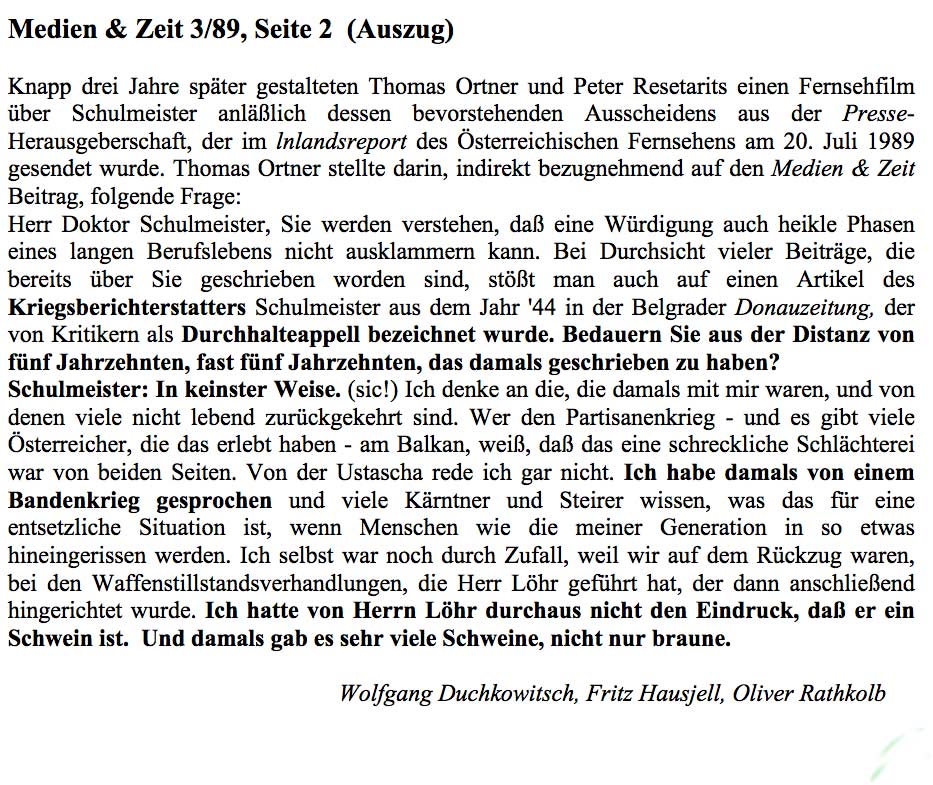
 Here are reviews by Edward Butscher and Aaron Kramer and a comment by Harry James Cargas of Borders/Grenzen by Peter Paul Wiplinger., my first book of poetry in translation. Regretfully there was no-follow-up.
Here are reviews by Edward Butscher and Aaron Kramer and a comment by Harry James Cargas of Borders/Grenzen by Peter Paul Wiplinger., my first book of poetry in translation. Regretfully there was no-follow-up.









 Users Today : 24
Users Today : 24 Users Yesterday : 156
Users Yesterday : 156 This Month : 1891
This Month : 1891 This Year : 9268
This Year : 9268 Total Users : 230404
Total Users : 230404 Views Today : 50
Views Today : 50 Total views : 1966893
Total views : 1966893 Who's Online : 2
Who's Online : 2
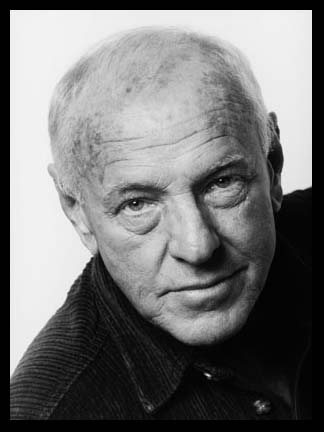






 (Franz Stangel was Commandant of Treblinka Concentration Camp. The number of his victims is nine-hundred-thousand) Stangl ended up in Brazil where Volkswagen gave him a sinecure in Sao Paulo. He made pocket money by advising the military dictatorship, as well helping Volkswagon to weed out and interrogate activists on their premises.
(Franz Stangel was Commandant of Treblinka Concentration Camp. The number of his victims is nine-hundred-thousand) Stangl ended up in Brazil where Volkswagen gave him a sinecure in Sao Paulo. He made pocket money by advising the military dictatorship, as well helping Volkswagon to weed out and interrogate activists on their premises.



